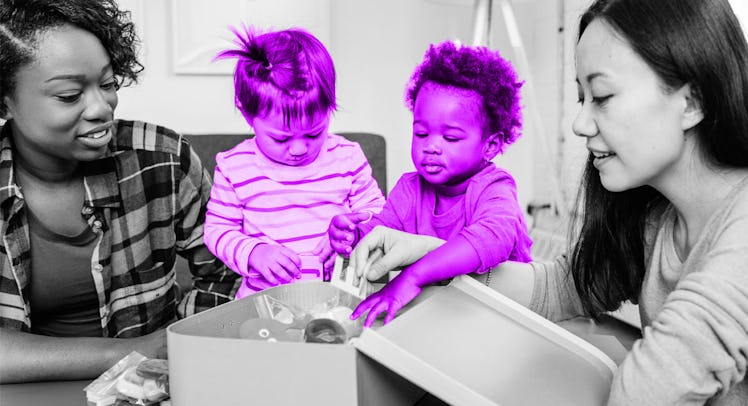How to Help a Preschooler Build Emotional Intelligence
Emotional maturity is as important for entering Kindergarten as knowing letters and shapes. With some coaching, parents can help a lagging preschooler.

Many parents with children approaching Kindergarten age worry about their child’s academic abilities. But recognizing shapes, letter, and numbers will not help a child too emotionally immature for the classroom navigate the politics of early academia. Parents preparing kids for school need to put an emphasis on building emotional intelligence. It’s a big ask, but an important one. And, yes, it’s possible to provide real help.
“Developmentally it’s amazing how ripe that time is for change,” explains Robert Zetlin, a positive psychologist and author of Laugh More, Yell Less: A Guide to Raising Kick-Ass Kids. “From a parent’s perspective, around 4 or 5-years-old it’s a balancing act between providing the child support and holding expectations high enough to reach for but not so high they are set up for failure.”
How to Help a Preschooler Become More Emotionally Mature
- Speak with preschool teachers to identify the issues and develop a plan of attack shared between the school and home.
- Help a kid understand appropriate behaviors and offer support by helping them break down the step to develop the behavior.
- Set up playdates so kids can practice their skills in larger social groups.
- Take the opportunity to point out examples of good and bad behavior from other kids while in the community.
- Remember that patience is key, all kids develop at a different pace.
The balance between support and expectations from parents is particularly important as a child enters school. Once they are in the Kindergarten classroom, children experience that dynamic every day. Given that, it’s they understand how to meet expectations with and without overt support. Emotional conditions vary and, in school as in life, resilience is key.
“From a kids perspective, they might like being at home and getting the attention they get and might not like competing for it at school,” explains Zeitlin. “Or they might not like the way the teacher holds boundaries, or feel they might feel embarrassed in front of friends.”
RELATED: 5 Ways To Help Your Toddler Develop Emotional Intelligence
All of these feelings can result in clingy behaviors or outbursts that aren’t conducive to a Kindergarten classroom. But they also offer parents a roadmap for intervention. That intervention begins first and foremost with coordinating with preschool teachers. They are an incredible resource who can help parents identify the specific issues and develop a consistent action plan between home and school.
A consistent plan is particularly important considering there is a lot that parents might not see. But once they understand the issues they can start a dialogue with children that will help orient them to where they need to be them and break down the steps to get there.
Those steps might include recognizing and naming emotions, interventions like speaking to an adult about those feelings or redirecting to another activity, and some de-escalation techniques like mindful breathing. But parents can’t expect children to simply soak up the information over a couple of talks. They’ll also need some practice.
MORE: The 3 Things I Do When My Toddler Melts Down That Help Build Emotional Intelligence
Practice is as simple as setting up the scenario and engaging in some low-stakes role play. So, perhaps, parents and teachers have identified that the behavioral issues are related receiving positive attention. Parents can the ask their kid to pretend that they need to get the attention of the teacher in an appropriate way, like raising their hand, saying “excuse me” or asking an appropriate question. But they need to actually do the behavior, just like a wide receiver practices running routes or a pianist practices chords.
For more authentic scenarios, parents can organizer playdates with multiple children and use the social interaction as an additional opportunity for practicing skills. If that’s not possible, then parents can look for examples out in the world, while shopping or going to the park. “Even your kid is clingy and wants to stay in your lap you can take the opportunities to find examples of appropriate behavior,” Zeitlin says.
But he also notes, that sometimes achieving the emotional maturity required for Kindergarten may simply take time. All kids develop at different rates and it may be that a child, with the right balance of expectation and support from parents, will bloom in the summer and be ready for their new challenges.
This article was originally published on